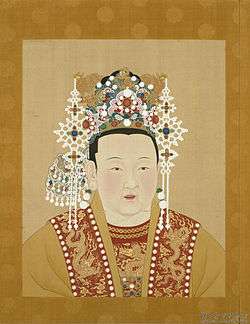Empress Xu (Ming dynasty)
| Empress Renxiaowen | |||||||||
|---|---|---|---|---|---|---|---|---|---|
 | |||||||||
| Born |
1362 Yingtian, Yuan Empire | ||||||||
| Died |
July 1407 (aged 45) Nanjing, Jiangsu, Ming Empire | ||||||||
| Burial | Changling, Ming dynasty tombs | ||||||||
| Spouse | Yongle Emperor | ||||||||
| Issue |
Zhu Gaochi, Hongxi Emperor Zhu Gaoxu, Prince of Han Zhu Gaosui, Prince Jian of Zhao Princess Ancheng Princess Xianning | ||||||||
| |||||||||
| Father | Xu Da | ||||||||
| Mother | Lady Xie | ||||||||
Empress Xu (徐皇后) (1362 – July 1407), formally Empress Renxiaowen (仁孝文皇后), birth name Xu Yihua (徐儀華), was the empress consort to the Yongle Emperor and the third empress of China's Ming dynasty. She was well educated, compiling bibliographies of virtuous women, an activity connected with court politics.[1]
Biography
Xu Yihua was born in 1362, as the eldest daughter of Xu Da and Lady Xie (謝氏). She had four brothers—Xu Huizu (徐輝祖), Xu Tianfu (徐添福), Xu Yingxu (徐膺緒), and Xu Zengshou (徐增壽)—and two younger sisters, who were the wives of Zhu Gui, Prince Jian of Dai (thirteenth son of the Hongwu Emperor) and Zhu Ying, Prince Hui of An (twenty-second son of the Hongwu Emperor). On 17 February 1376, she married the Zhu Di, Prince of Yan, the Hongwu Emperor's fourth son. After Zhu Di ascended the throne as the Yongle Emperor on 17 July 1402, Xu Yihua, as his primary wife and consort, was created empress in December 1402.
A devout Buddhist, Xu is the first person credited with transcribing a Buddhist sutra from a dream revelation. The work is entitled Da Ming Ren xiao Huang hou meng kan Fo Shuo di yi xi yu da gong de jing (The sutra of great merit of the foremost rarity spoken by the Buddha which the Renxiao empress of the great Ming received in a dream). In her introduction to the sutra, the empress wrote that one night after meditating and burning incense, Guanyin appeared to her as if in a dream, and took her to a holy realm where the sutra was revealed to her in order to save her from disaster. After reading the sutra three times, she was able to memorize it and recall it perfectly upon awakening and writing it down. The sutra conveys conventional Mahayana philosophies, and the mantras for chanting were typical of Tibetan Buddhist practices.[2]
Family
- Father
- Mother
- Lady Xie (謝氏), second daughter of Xie Jianxing (謝再興)
- Husband
Sons
| Number | Name | Formal Title | Born | Died | Spouse | Issue | Notes |
|---|---|---|---|---|---|---|---|
| 1 | Zhu Gaochi 朱高熾 | The Hongxi Emperor | 16 August 1378 | 29 May 1425 | Lady Zhang, Empress Cheng Xiao Zhao 11 concubines | Zhu Zhanji, Xuande Emperor Zhu Zhanxun, Prince Jing of Zheng Zhu Zhanyong, Prince Jing of Yue Zhu Zhanyin, Prince Xian of Qi Zhu Zhanshan, Prince Xian of Xiang Zhu Zhangang, Prince Xian of Jing Zhu Zhanyu, Prince Jing of Huai Zhu Zhankai, Prince Huai of Teng Zhu Zhanji, Prince Zhuang of Liang Zhu Zhanyan, Prince Gong of Wei Princess Jiaxing Zhu Yuantong, Princess Qingdou Princess Qinghe Princess De'an Princess Yanping Princess Deqing Princess Zhending | |
| 2 | Zhu Gaoxu 朱高煦 | Prince of Han 漢王 | 30 December 1380 | 6 October 1426 | Consort Wei 韋妃 | Zhu Zhanhe, Heir Apparent Yi Zhuang Zhu Zhanqi, Heir Apparent Zhu Zhanci, Prince of Jiyang Zhu Zhanyu, Prince of Linzi Zhu Zhanyi, Prince Zichuan Zhu Zhanxing, Prince of Changle Zhu Zhanping, Prince of Qidong Zhu Zhandao, Prince of Rencheng Zhu Zhanchang, Prince of Haifeng Zhu Zhanbang, Prince of Xintai | |
| 3 | Zhu Gaosui 朱高燧 | Prince Jian of Zhao 趙簡王 | 19 January 1383 | 5 October 1431 | Lady Xu (daughter of Xu Zhang (徐章)) Lady Mu (daughter of Mu Cheng (沐晟)) | Zhu Zhanba, Heir Apparent Daoxi of Zhao Zhu Zhanque, Prince Hui of Zhao a son | Created Prince of Zhao on 12 May 1404 |
Daughters
| Number | Title | Born | Died | Date Married | Spouse | Issue | Notes |
|---|---|---|---|---|---|---|---|
| 1 | Princess Ancheng 安成公主 | 1384 | 16 September 1443 | 1402 | Song Hu 宋琥 (second son of Song Cheng, Marquess of Xining) | - | |
| 2 | Princess Xianning 咸寧公主 | 1385 | 27 July 1440 | 1403 | Song Ying 宋瑛 (third son of Song Cheng, Marquess of Xining) | - |
Notes
| Chinese royalty | ||
|---|---|---|
| Preceded by Empress Xiaominrang |
Empress of China December 1402 – July 1407 |
Succeeded by Empress Chengxiaozhao |